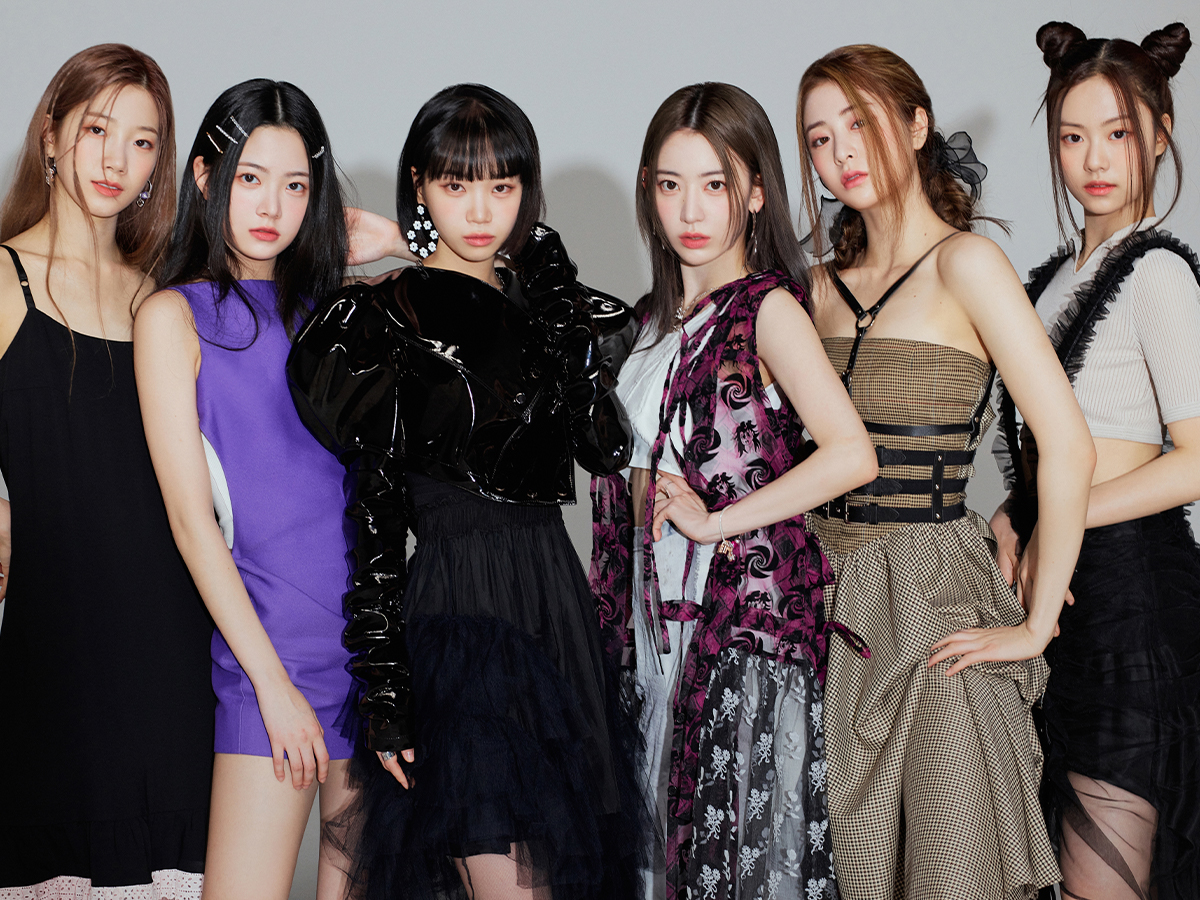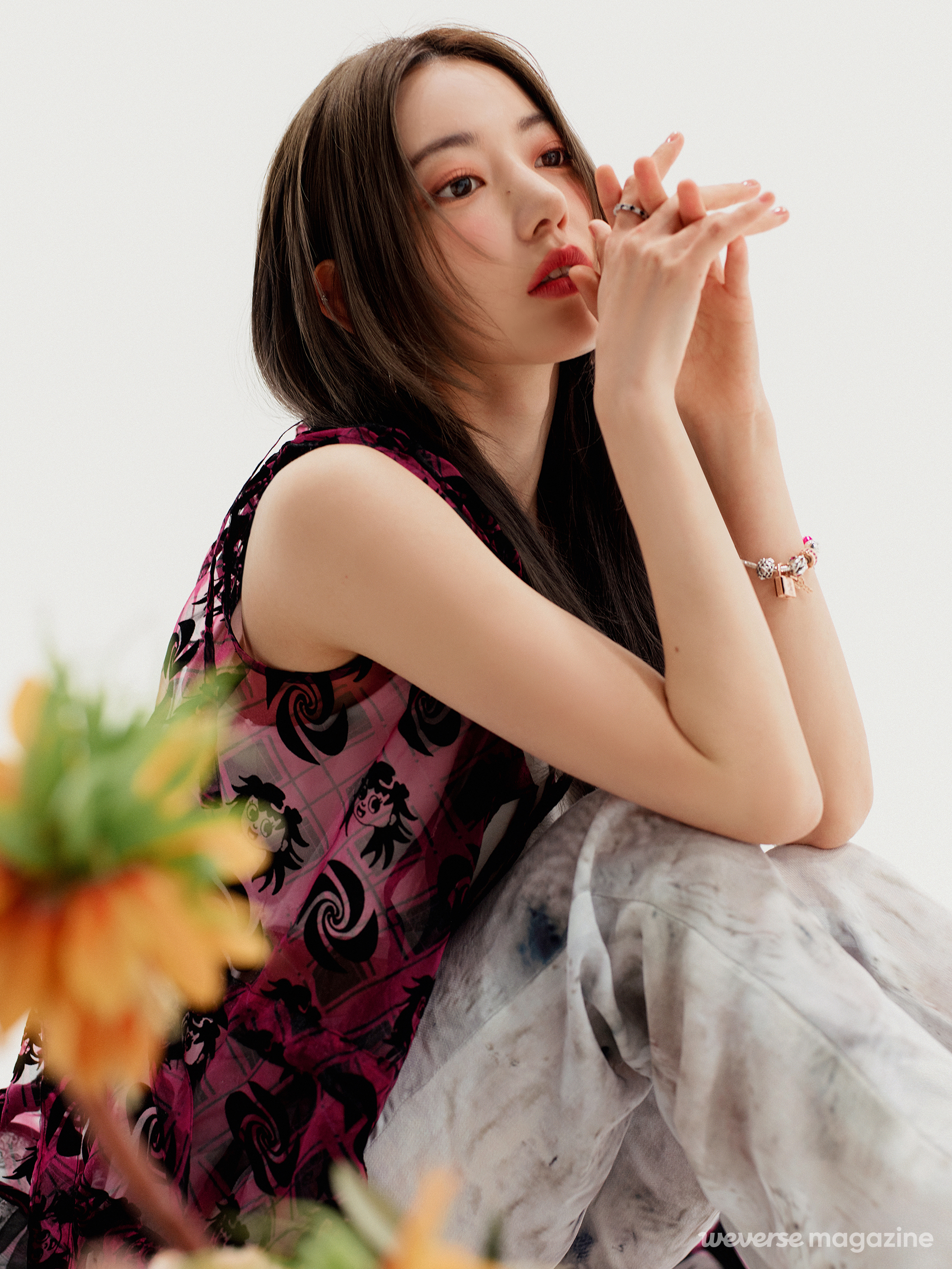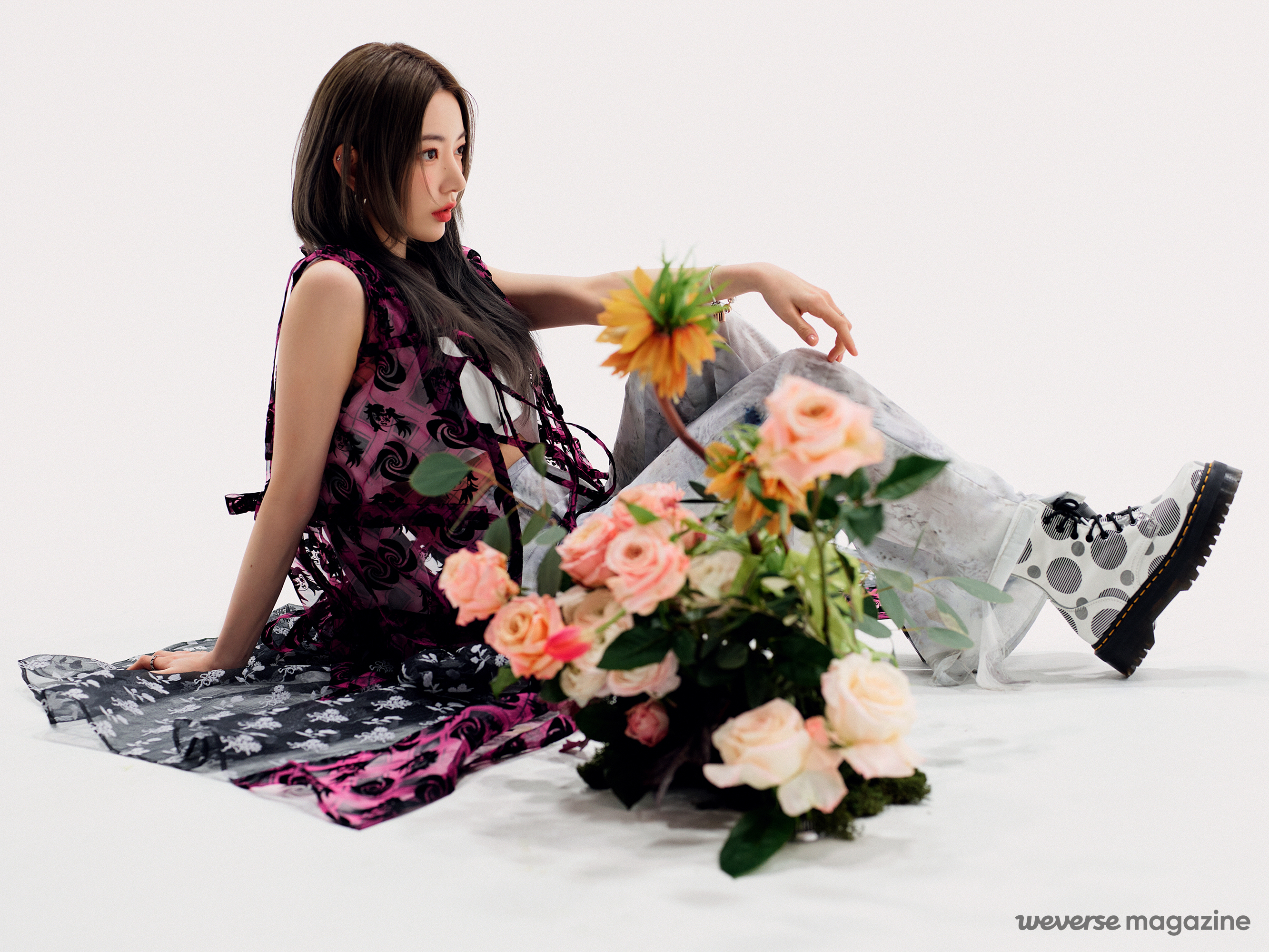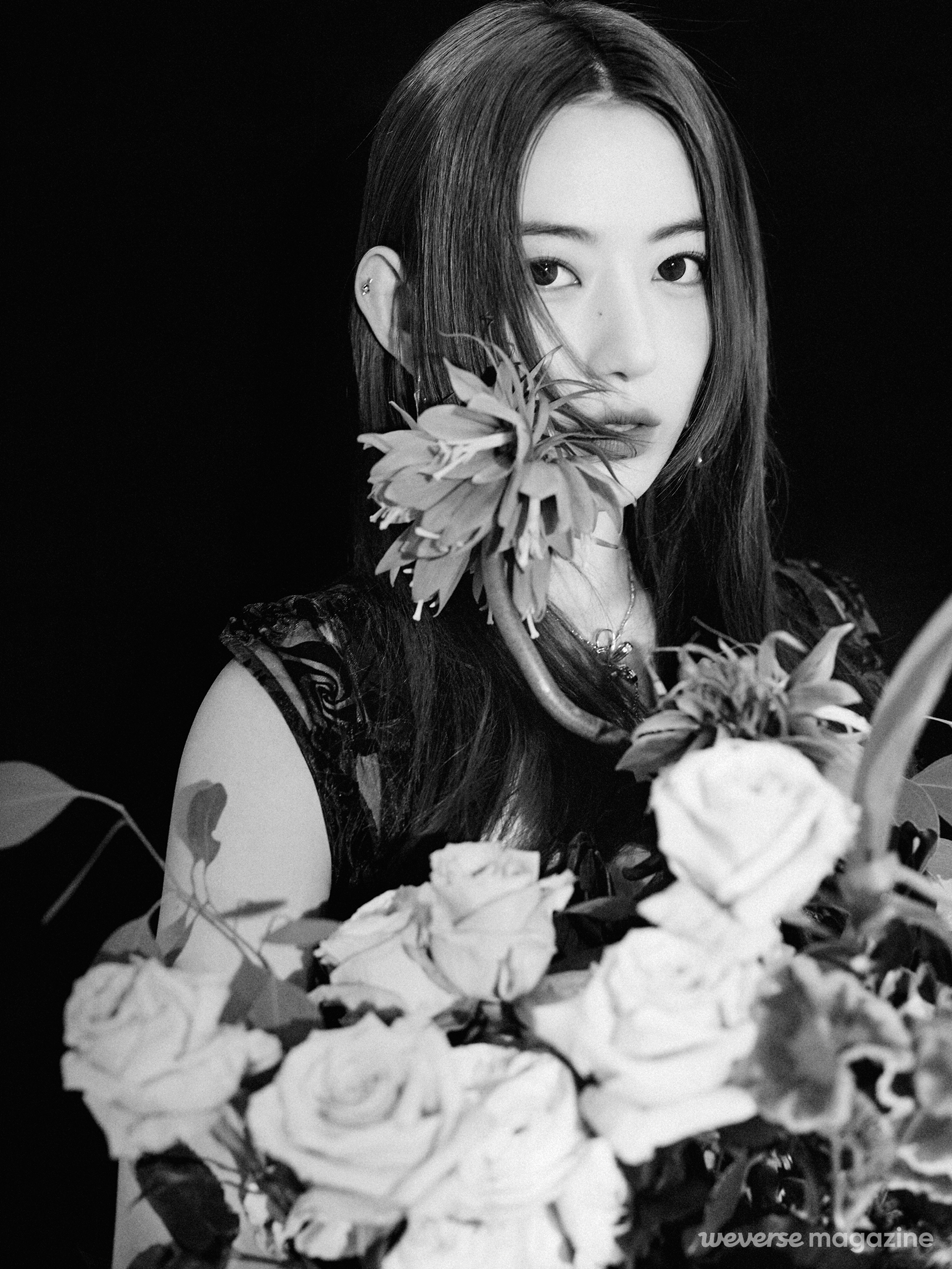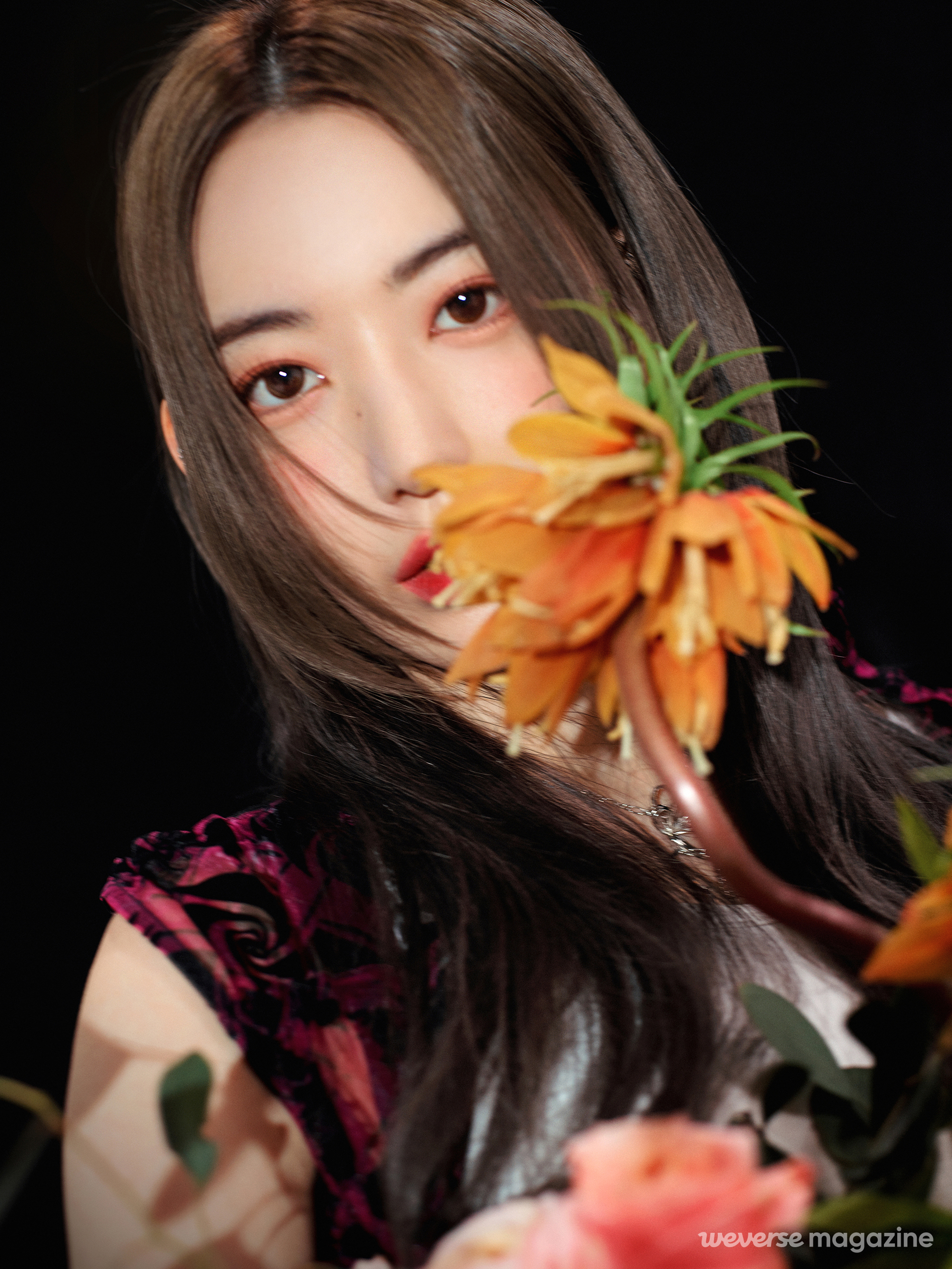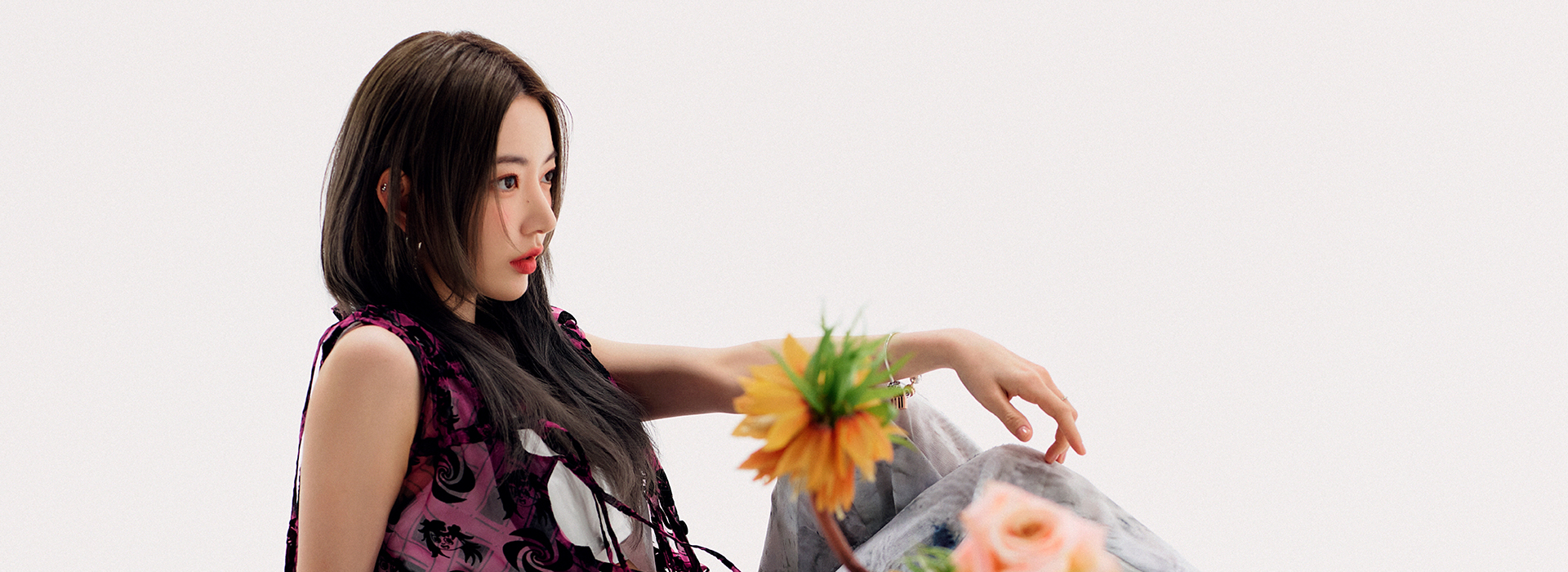
While talking with SAKURA, a line from “Blue Flame” came to mind: “Blue, hotter than the flame.” Even with her calm, articulate way of speaking, there was no hiding the heat from her passion—a flame that has been burning for 12 years.
You’re debuting for the third time, this time with LE SSERAFIM.
SAKURA: This feels different, for sure. The first time I debuted was in Japan when I was 13, but I was so young that I didn’t know anything about being an idol. But LE SSERAFIM will likely be my last debut and my last group, so I really want to do well.
You have already found quite a lot of success in both Japan and Korea. Still, it must have been a difficult decision to debut again outside of your home country.
SAKURA: I knew I wanted to keep being an idol. I’ve found so much joy in the relationship with my fans over the more than 10 years I’ve been an idol and I just thought about how I want to do as many performances as possible with them there. And I’m not yet fully satisfied with my own performances, so I wanted to show them something that shows more of the way I’m growing, too. I figured any path I chose would be difficult, and I thought I wouldn’t regret choosing this one. It was harder than I thought, though. (laughs) I actually didn’t go through a trainee period, so this was the first time I practiced this much for so long before debuting. I really think I needed the time. I took Korean lessons for the first time, and I took lessons to practice vocals and dance from the basics, which was nice. It was hard, but it was an important and meaningful time for me, looking back.
What was the hardest part?
SAKURA: Whenever I’m having a hard time, I usually think, This is the hardest thing I have ever had to do. But this time it really was the hardest thing. (laughs) When I was working as an idol, I was used to performing on stage for fans, but it’s different as a trainee, when it isn’t being shared with the world. I can’t believe how closely the fans paid attention to my performances—they would tell me I did a good job and give me detailed feedback. I was anxious about whether I was doing well or improving without hearing that kind of encouragement. It taught me how important it is to have fans. I want to show them what I can do now as fast as humanly possible.
Now that you have gone through all these tough new experiences like changing labels, studying Korean and being a trainee, what are you looking forward to showing to the world?
SAKURA: I would say the biggest challenge for CHAEWON and me was wanting to present something we’ve never shown before. If you look at the lyrics to “FEARLESS,” our debut song, that’s really about us. When I saw the lyrics, I thought, Why shouldn’t I be allowed to do what I want? To be honest, I think there are going to be people who will see the new me and feel confused and have a hard time accepting it. The lyrics even say, “Telling me to hide my desire, that’s weird.” I felt the same way throughout my 10 years of being famous.
-
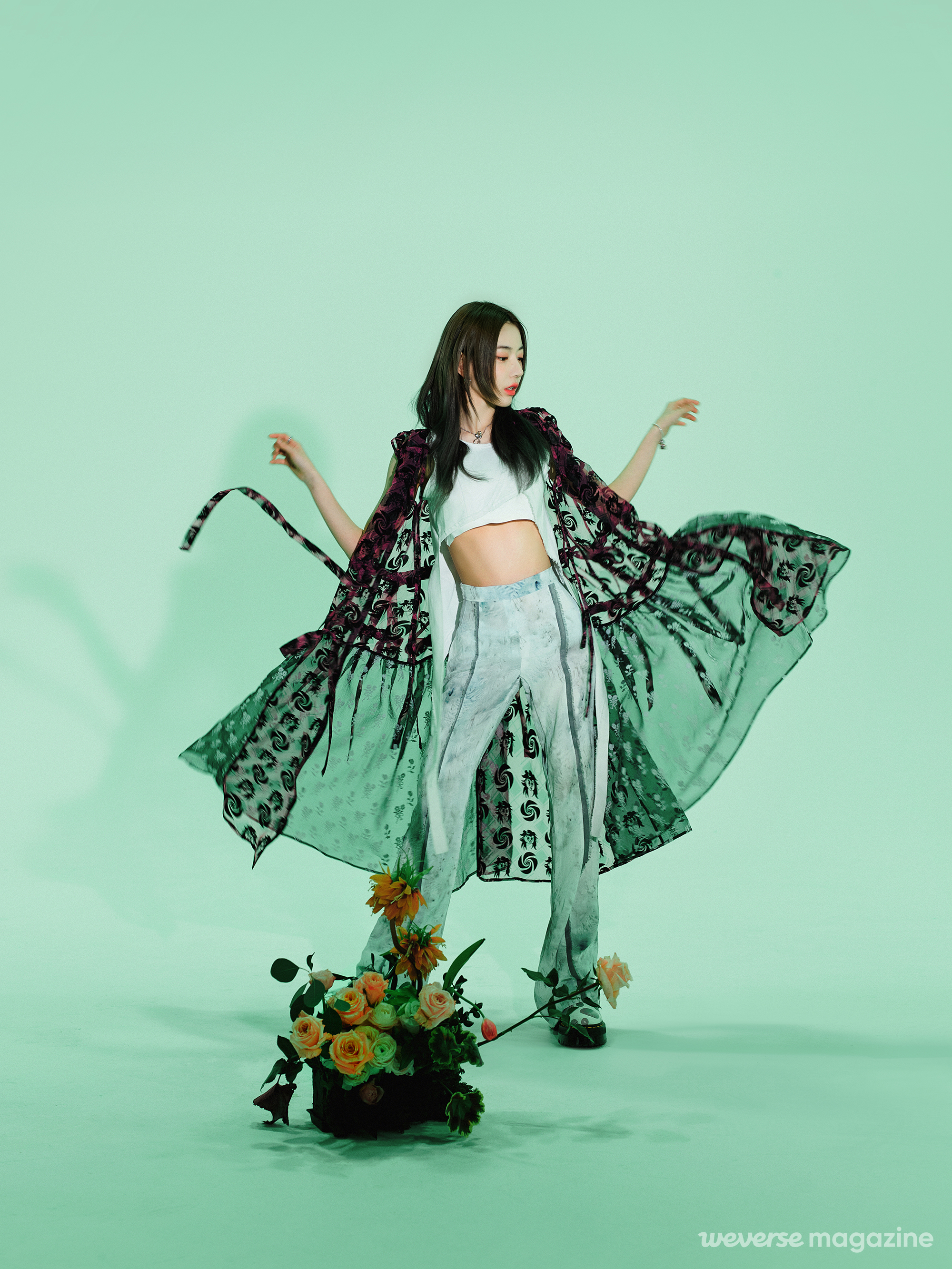 SAKURA’s pants by sLosLowLee and shoes by Dr. Martens.
SAKURA’s pants by sLosLowLee and shoes by Dr. Martens.
I think you were worried about showing off this new side of yourself, in a way.
SAKURA: I wasn’t without my worries. People who have liked me till now could end up thinking, What happened to the Kkura I used to like? But people can’t always stick to the same thing, and their capacity for expressing themselves and the things they can say will change based on how old they are. I think the fact that I keep challenging myself makes me cool, plus I think trying new things is the only way to keep growing. Even if the way I look on stage has changed, I’m still the same old Sakura Miyawaki. The SAKURA who loves gaming won’t change—the only time I will change is when I’m on stage. I want to show people who I really am.
The way you look so confident and aloof in “FEARLESS” and do that low chant in the chorus without raising your voice is something we have never seen from you before.
SAKURA: The first time I heard the song, I was so happy that I screamed. (laughs) But it was the first time for me to try that style of song and choreography, so I was also worried whether I could handle it. I used to always try to use this beautiful singing voice, but the producer, 13, told me I had to really feel it if I was going to pull at peoples’ heartstrings, so I tried to think about the meaning of the lyrics and why it was we were singing this particular song while recording. The song is what we wanted to say for real, so even when we danced, the way we expressed ourselves and moved all felt natural. I feel like it’s the kind of performance where you don’t need to sugar-coat anything, just be yourself.
You pull off a high falsetto in the chorus for “Blue Flame,” even though it’s the first time for us to hear those kinds of vocals from you.
SAKURA: Let me just say that it was hard with all those English lyrics. (laughs) Since I’m studying English now and there were some hard parts in the song, I was really careful with my pronunciation. I got a lot of help from YUNJIN since she’s so good at English. And I used to mostly just practice Korean pop songs, but I have been practicing English pop songs for the first time ever since I came to this label, so the way I vocalize has changed and I have had different kinds of experiences with singing. I’ve always felt pressure about singing, so I was always nervous going into the recording studio, but now I think positive—This is so fun! I want to get even better—even when practicing for live performances.
How has it been getting ready for performances? There are countless moves in “Blue Flame” that draw from the basics, but at the same time I’m guessing you had to practice a lot in order to get the details lined up just right with the other members.
SAKURA: It took a long time for us to sync up when we practiced “FEARLESS” since it was our first time together, I guess. But after working on lining up our performances for that song so much, “Blue Flame” didn’t take long to practice, and all the details fell into place, even though we hardly had any training for it. And we all said, “We’re really becoming a team now!” (laughs) I have this huge iPad that we take videos with every day and we play it back and break it down slowly—seriously, second by second—and we work on anything we find where we aren’t matching up, so now my iPad is completely full of … there’re so many videos. (laughs) And sometimes we watch old videos together and say, “We got a lot better.” I’m almost always in the practice studio when I’m not sleeping, and that makes me feel like it’s all worthwhile. I’m really proud of all of us.
What did you and CHAEWON talk about while practicing with your new group? Even though you were in IZ*ONE together, too, some things must have been new to you since it’s in a different environment.
SAKURA: CHAEWON is so different now. There were several other, older members and even a leader when we worked together last time, so I never saw her talk about practice. But we’re the oldest ones in LE SSERAFIM, so we have to guide the younger members. I was still really surprised to hear something like, “This part isn’t working, so let’s practice it more,” coming from her, though, and I thought she was really cool when she said that. We didn’t talk much when we were getting ready for the debut, either, but we could understand each other with just a look. I told her there’s no way I ever could have come this far without her, and she said she felt the same way, which made me feel grateful. CHAEWON and I never really used to tell each other about the difficulties we were facing, but now we’re so comfortable that we can talk more and more about any difficulties or concerns we have even when we’re in front of the other members.
It sounds like the tight bond between all the members is what makes it possible to talk through the difficult parts.
SAKURA: It’s amazing how close we are and how well we get along even though we haven’t been practicing together long. (laughs) It took a little while for the members of the group to be decided. There were a couple times where we had a hard time with having to practice every single day even though we didn’t know when we could debut, too. But, looking back, I guess we had to have those hard times in order to get the six of us all together. If even one of us had chosen a different path, we never could have been able to get together. I could have been working in Japan, CHAEWON taking a different path, YUNJIN studying in the US—so I think it was fate. I used to have an individualistic side and a lot of people mistook me for being cold, but now I’m more interested in looking after the other members than myself, and it’s harder to watch them struggling with something than to struggle with it myself. As the oldest member, and the one with the most experience, I want to look after all of them.
Is there something you can tell the other members based on your own experiences?
SAKURA: I want to tell them how to deal with any difficulties or concerns they might face during the debut, since they might face things similar to what I did before. A lot of things get said about you when you’re in the spotlight. It was hard at first to see people who never even met me saying things about me without knowing whether they were true or not. But there’s a 2:6:2 rule. 20% of people like you no matter what you do, 60% make a judgment call after seeing what you do, and 20% will hate you no matter what. So the way I want to see it is, whatever you do, don’t listen to the people who hate you no matter what, and just show your hardworking side to the people who judge you fairly. You can’t change what’s already happened, but if you do your best with what you’ve got, you can turn those people’s attention into support, and I think that’s the kind of future I want to let them know about.
I imagine you have a lot of thoughts to share, having been active for so long. It’s well known that you like reading and watching movies, so much so that you said you want to write a novel about your experience with being an idol. Do you also find comfort in books and movies?
SAKURA: My parents send me popular novels from Japan a month, and I get a lot out of reading them whenever I have a little time to do it. Sometimes I wonder if my life is hard because I chose to be an idol, or if I could be happy doing anything else, but when I look into people living lives I never have, I realize that everyone has it hard during hard times and feels happy during the happy times. I think that’s why I like books and movies.
You also wrote a movie column in Japan. I was really impressed with your review of Close-Knit, where you said, “We need to develop a better understanding of LGBTQ community.”
SAKURA: There was actually an atmosphere of caution around idols speaking their minds around that time. But I thought I could say that anyway. Idols don’t just sing and dance on stage—they can also be role models for people, and someone who is always by their side for others. So I wanted to let people know there were others with these kinds of thoughts, and I also thought that if an idol was talking about the issue that even more people could become aware of it, too. Some day our group might sing a song about love and I have this idea that I’d like to sing about love that’s universal.
The message of “FEARLESS” is to be fearless no matter what other people think. What do you think it means to be fearless?
SAKURA: I think being fearless means admitting to your flaws. I have them, too. I struggle at times; there are times when I cry; I get depressed sometimes, too. But I don’t think, Why am I feeling this way? I really shouldn’t! Instead, I think, I guess it’s that kind of day. I should just do my best. I think you can overcome your fears by acknowledging yourself. Nobody’s perfect.
This year is the 12th year of your career and I imagine you’ve had as many good times, professionally speaking, as difficult ones. How is it you’re able to get past your fears and keep going?
SAKURA: The biggest thing is having the fans. Seriously. Not being able to talk with the fans while preparing for the debut has been really hard. It felt like losing my best friend. Having a connection with the fans is amazing. To the point that I would want to perform even if I only had one fan left. And I feel like the stage is where I belong, so no one can stop me when I’m up there. People can see it all on the stage: how much I practiced, how serious I am about the performance. The fans love seeing that, so I can’t help but love to perform.
That makes me think of something you wrote in a review of the movie The Passion of Augustine: “Maybe the reason I became an idol was for the thrill, too. In the future, I want to have the courage to take a walk on the harder side, the somewhat more dangerous side of life.”
SAKURA: I would really regret it if I chose the easy way forward. I don’t want to feel like my shining past is all behind me. It might look like I used to shine brighter because everyone has a different perspective, but when I stop and think about it, I think I feel like I’m more mature now than ever before, so I choose to challenge myself with a more challenging path.
Then are you shining now?
SAKURA: Ah—yes! (laughs) I feel like I’m in a good environment where I can try my best at everything I want to do and I’m happy because I’m with the other members and all the staff are great. That happiness won’t fade easily, no matter what anyone says. And I want to show everyone how much I’ve grown because I have never put in so much effort in my whole life. I still feel like I have further to go, but I’m shining bright.


Unauthorized reproduction and distribution prohibited.
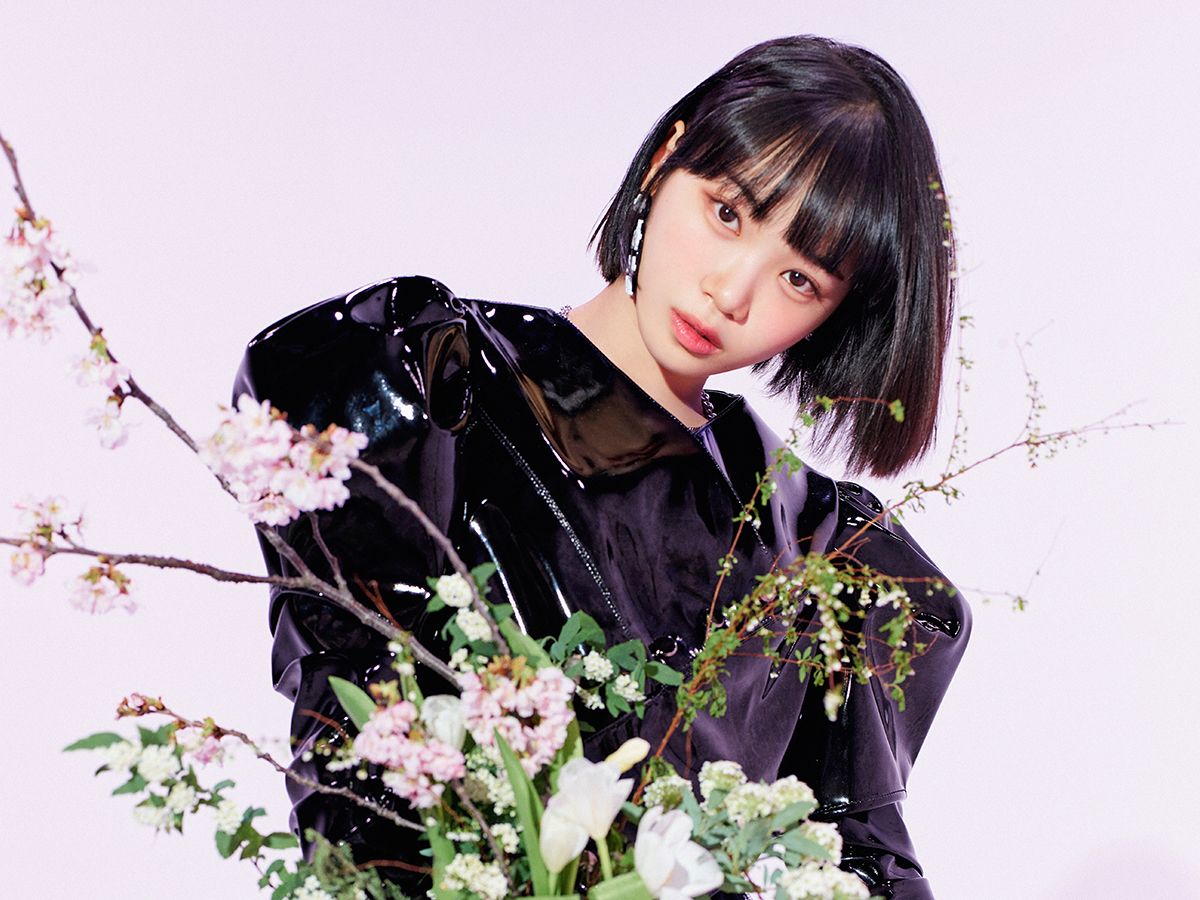
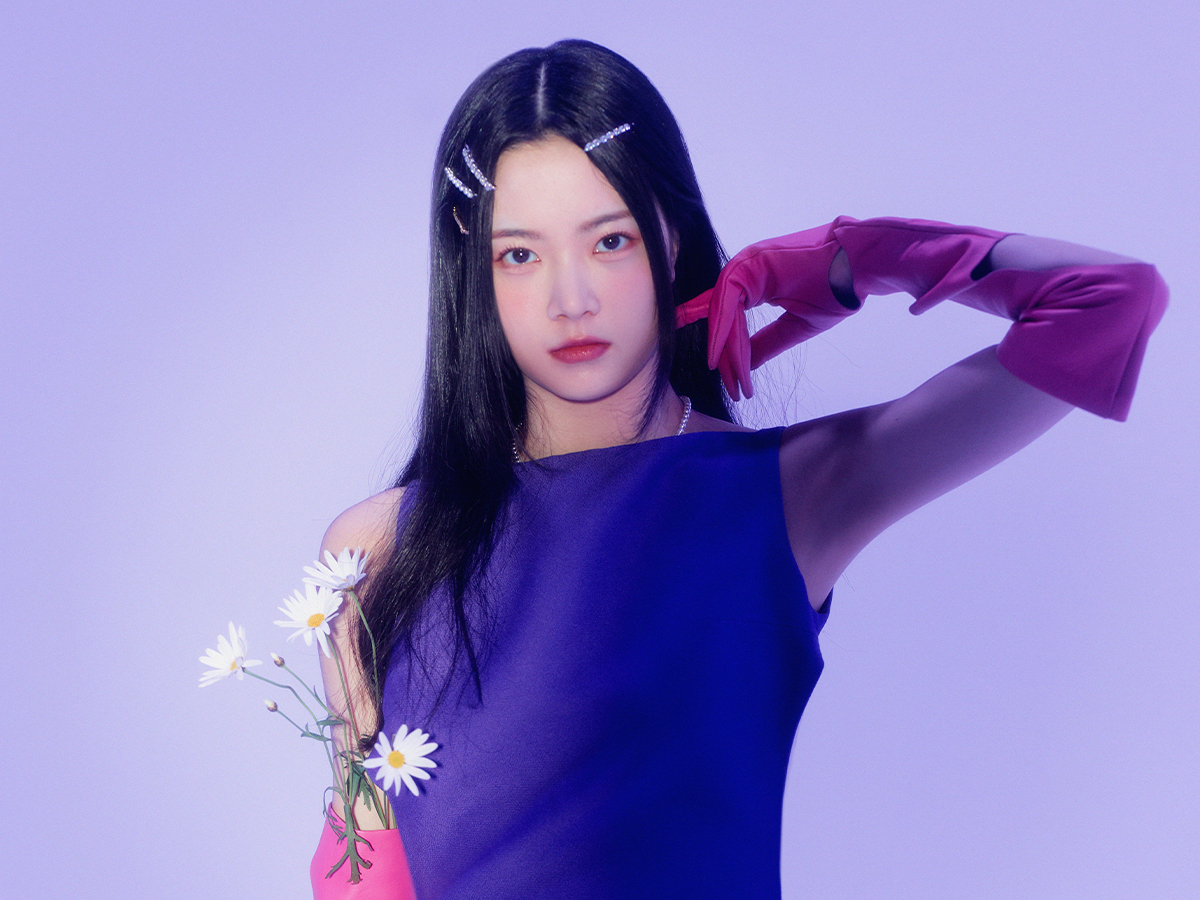
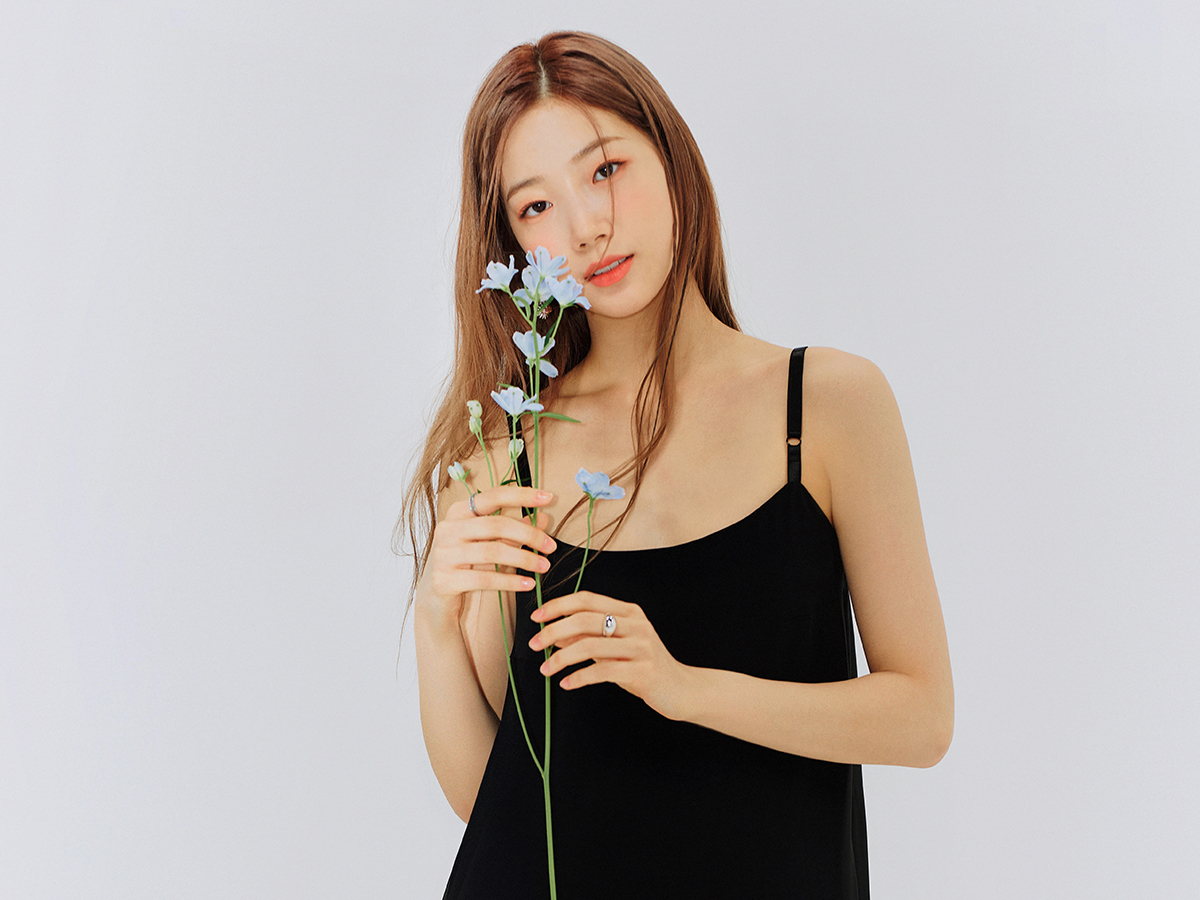
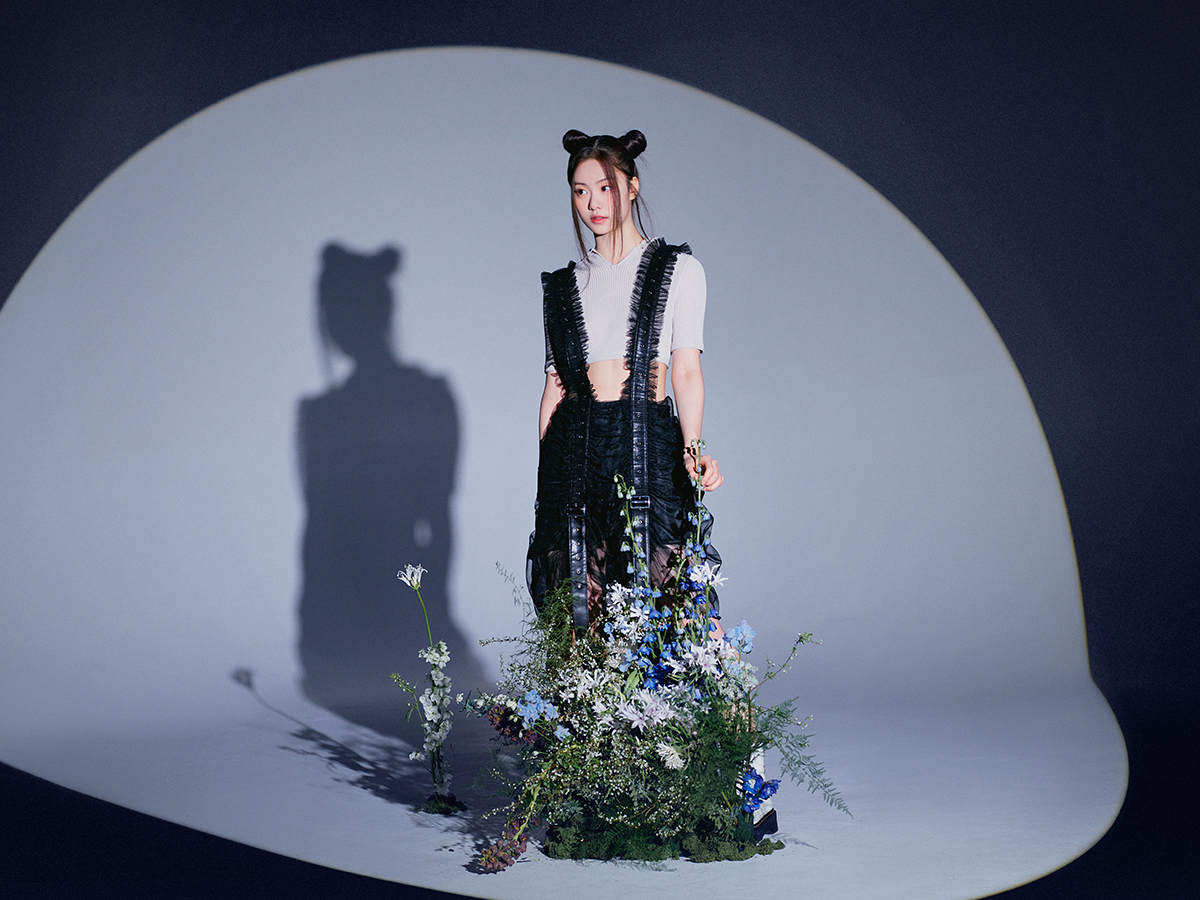
- LE SSERAFIM Other Cuts2022.05.15
